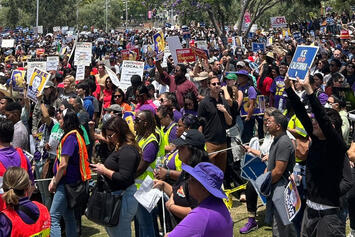
The recent riots in Los Angeles, sparked by President Trump’s crackdown on undocumented immigrants, could be a harbinger to a new era of ethnic conflict not only in the U.S. but throughout the West, including Canada.
Many leading countries for immigrants, notably in the Middle East, may have higher percentages of international migrants, but many are only there temporarily. But in Canada, Australia, and the U.S. — where the foreign born represent between 15 and 30 per cent of the total population — most come to stay, with sometimes problematic results.
President Joe Biden changed immigration policies, allowing millions, some barely vetted, to enter at ever increasing rates, causing the number of undocumented immigrants to soar past 11 million. Until recently, former Canadian prime minister Justin Trudeau followed a similar liberalization that allowed large numbers of migrants, some coming as refugees, into the country.
In both countries, the mass migration has deepened already serious class divides as many new migrants remain poor. In Canada, one in five recent immigrants now lives in poverty, with most suffering from “deep poverty” — an income below 75 per cent of the poverty line — compared to only five per cent of the whole population.
Such complexities are rarely part of the public discussion of immigration. In the U.S. legacy media spin on the crackdown focuses on the abuses and often ham handed approach used by the Trump administration in working class Latino communities. Stories of individual cases of respectable and upright families targeted by the crackdown predominate, stirring up ever more fear of a racist, even “fascist” crackdown on minorities.
In contrast, the MAGA view focuses on criminal migrants and radical demonstrators, some of whom have engaged in violence. The images of young protesters waving Mexican flags is offensive to many American citizens, even in California. For MAGA, the crackdown represents both a return to legality as well as a defence from hostile elements.
Both views largely ignore a more complex, and often contradictory reality. Historically, as immigrant advocates rightly claim, the migration of peoples have been critical to the economic health, and cultural dynamism, of countries such as the United States, Canada, Australia, the United Kingdom, and France.
Guest workers, for example, played a critical role in the revival of Europe’s economies, and steady immigration sparked growth in Canada, the U.S. and Australia. Yet as immigration levels have soared, the economic payoffs seem to be increasingly dubious, particularly when we put into account the changing structure of the labour market.
The reality is that immigrants are not only filling in for jobs with no workers, but are replacing native born workers who are increasingly on the sidelines. In much of Europe up to one quarter to one-third of the population under 30 is neither in school or working. In the U.K. one out of seven under 25 is on the economic sidelines, the highest level in a decade.
Much the same pattern is emerging in North America. In the U.S., labour participation has steadily dropped since 2000. More American men are now out of the workforce than in a half century. Canada too has a declining labour participation rate, which is now at the lowest level since 1997.
These two phenomena — immigrant poverty and native non-participation — likely intersect. The immigrant’s presence at the lower end of the labour market does tend to retard wage growth , as noted by a recent Congressional study , and could discourage natives from work. This may be a boon for professionals for cheaper waiters, busboys, gardeners, and nannies but not for working class people. Early claims that Trump’s crackdown has helped reduce crime and lifted wages for low-income workers should be treated with care, but could become persuasive, at least outside the media and academic establishment.
Read the rest of this piece at: MSN.
Joel Kotkin is the author of The Coming of Neo-Feudalism: A Warning to the Global Middle Class. He is the Roger Hobbs Presidential Fellow in Urban Futures at Chapman University and and directs the Center for Demographics and Policy there. He is Senior Research Fellow at the Civitas Institute at the University of Texas in Austin. Learn more at joelkotkin.com and follow him on Twitter @joelkotkin.
Photo credit: Union workers rally for David Huerta, the president of Service Employees International Union California, who was arrested during a Los Angeles protest, via SEIU California, under CC 3.0 License.












